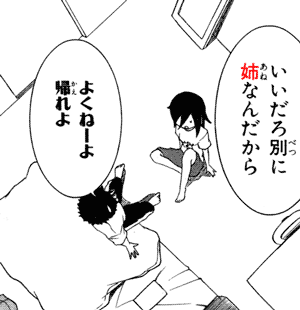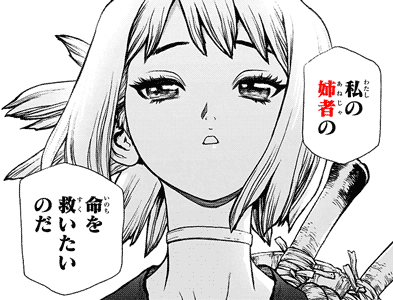In Japanese, ane 姉 means "older sister." It's somewhat synonymous with oneesan お姉さん, but differs in usage. (see ane vs. oneesan).
The "older brother" counterpart would be ani 兄, while imouto 妹 is "younger sister."
Kanji
The kanji of ane is 姉.
Given that ane is written with a very basic kanji, it's unlikely to be written without kanji, but here's how you'd write it with kana anyway just in case:
One example:
- Context: girl goes inside her brother's bedroom, but he doesn't want her there.
- ii daro betsu ni
ane nan-dakara
いいだろ別に
姉なんだから
[It's alright, isn't it? Something like this doesn't matter.]
Because I'm your older sister.- If you are wondering "how did this little dialogue bubble end up becoming such a long translation," that's because Japanese hates you.
- This is a dislocation.
- betsu ni
別に
Doesn't matter. Whatever. Either way is good. - ii
いい
Fine. Alright. Okay. Allowed. Permissible. - daro
だろ
Isn't it?
- yokunee yo
よくねーよ
[No, it isn't!]- It isn't alright!
- kaere yo
帰れよ
[Go away!]- Return!
Derived Words
A number of Japanese words derive from ane 姉 and also mean older sister.
The word aneue 姉上 is an older respectful term which isn't used much nowadays. In anime, characters that use aneue are often from more traditional or anachronistic families.
The word aneki 姉貴 is a more casual and respectful term. It's sometimes used to an older sister figure instead of one's actual sister.
The word anego 姉御 is a similar in that it refers to one's older sister with respect, but isn't used as frequently. Within gangs, the word refers to the wife or girlfriend of one's senpai 先輩. (see aniki 兄貴)
The word aneja 姉者, from anejahito 姉者人, also refer to an older sister, but this is a very old word that isn't used anymore.
- watashi no
aneja no
inochi wo
sukuitai
no da
私の姉者の命を救いたいのだ
[I] want to save my older sister's life.


No comments: